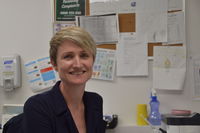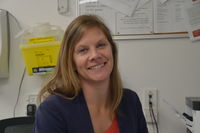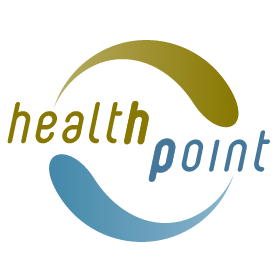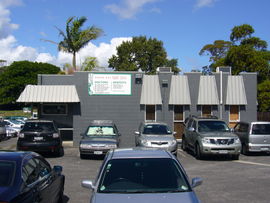West Auckland > GPs / Accident & Urgent Medical Care > ProCare >
Green Bay Medical Centre
General Practice (GP) Service
Today
Description
We are a family focused centre offering a full range of general practice services to you and your family.
Consultations are by appointment, our standard consultation time is 10 minutes.
Staff
Our team is made up of 6 GPs (see details below under “Doctors”) and:
Practice Manager: Dianne Gamble
Nurse Practitioner: Carole Roscoe
Nursing Staff: Tracy, Effie, Clydell, Kylie, Michelle and Georgia.
Receptionists/Admin: Sophia, Donna, Mandy, Kimberley, Andrea, Lisita, Nicole, Kate, Saini, Layna & Ella
Doctors
-

Dr Ona Blanks
General Practitioner - Vocationally Registered
-

Dr Cushla Borthwick
General Practitioner - Vocationally Registered
-

Dr Therese Larsson Hogman
General Practitioner - Vocationally Registered
-

Dr Deborah Mitchell
General Practitioner - Vocationally Registered
-

Dr William Reyneke
General Practitioner - Vocationally Registered
-

Dr Mei-Yen Toh
General Practitioner
Enrolling new patients
No
This practice is not currently enrolling new patients.
Although our books are officially closed to new patients, we at times have room for family members who live at the same address and sometimes for Green Bay residents to join the Practice as patients move out of the area.
Although it is not generally possible to choose your new GP, if there is a family connection please advise us via the 'Special circumstances' section on the application form.
Fees
Enrolled Patient Fees
| Age Range | Without CSC | With CSC |
|---|---|---|
| Under 6 years | Free | Free |
| 6 to 13 years | Free | Free |
| 14 to 17 years | $13.00 | Free |
| 18 to 24 years | $29.50 | $19.50 |
| 25 to 44 years | $29.50 | $19.50 |
| 45 to 64 years | $29.50 | $19.50 |
| 65+ years | $29.50 | $19.50 |
Consultation Charges (for a Standard 10 minute medical consultation)
Patients Enrolled with the Practice
Children 13 years and under: No charge for routine GP or Nurse consultations.
Teens 14 - 17 years: $13.00
Adults aged 18 years and older: $29.50
Home Visits (if available): $40
NZ Citizens not enrolled with the Practice
Children under 6 years: No charge at present
Children 6 - 17 years: $40
Adults aged 18 years and older: $60
Non-NZ citizens (those not entitled to NZ Health benefits) All ages; $75
Community Service Card Holders
Patients not enrolled with the Practice:
Children under 6 years: No charge at present
Children 6 - 17 years: $35
Adults aged 18 years and older: $45
Prescription Charges
Enrolled patients
Children 13 years and under: No charge
Teens 14 to 17 years: $7
Adults: $15
Faxed prescription: $6 extra within Auckland City (or $12 outside the Auckland Toll-free area)
Visitors and non-enrolled patients
Children 0 to 17 years: $10
Adults (18 years & over): $20
Faxed prescription: plus $6 within Auckland City (or $12 outside the Auckland Toll-free area)
Fees for ACCIDENT CONSULTATIONS: ACC Surcharge - those patients without a Community Services Card Teens 14 - 17 $20 and Adults $25
Extra charges (on top of consultation fee):
Letters (Referral, Insurance etc): $12
Cervical Smears: $7
ECG s: $30
Travel medicine consultations: $60 (plus any recommended vaccinations)
Dressings (each): $7 - $18 (plus materials according to cost)
We require that you pay your account at the time of the consultation.
Please note that additional charges will apply if payment is not received on the day of consultation:
- $5 deferred fee - this is a non-recoverable administration charge;
- $15 account processing fee: The fee covers the administration of our debtors ledger and will be added to your outstanding account.
Outstanding debts are placed with a debt collection agency - an additional fee is applied when the request for debt recovery is made.
Hours
| Mon – Fri | 8:00 AM – 5:30 PM |
|---|
Hours change over holiday times such as Christmas/New Year and the Thursday before Easter.
NO URGENT CLINICS UNTIL FURTHER NOTICE:
The following doctors are generally available at these times:
Monday: Doctors: Borthwick, Larsson Hogman, Reyneke and Toh
Tuesday: Doctors: Borthwick, Blanks, Mitchell & Reyneke
Wednesday: Doctors: Borthwick, Blanks, Larsson Hogman, Dr Reyneke and Toh
Thursday: Doctors: Dr Borthwick, Larrson Hogman and Reyneke
Friday: Doctors: Borthwick, Blanks, Mitchell and Toh,
Doctors Gina Kaye & Deb Mitchell share the care of their patients. Doctors Ona Blanks & Therese Larsson Hogman also share care of their patients.
AFTER HOURS
When the Practice is closed our main phone line (09) 827 4075 is diverted to Homecare Medical and a registered nurse can give advice about care or advise about after hours services. Alternatively, phone Healthline on 0800 611 116 (a Ministry of Health service).
In an emergency please call 111 - ask for AMBULANCE.
“From 24 December 2024, through to 05 January 2025, patients can access via Indici Patient Portal, online appointments with an expert CareHQ GP. Pricing for patients will be $19.50 for CSC card holders and $49.95 for non-CSC card holders – ProCare will ‘top up’ the difference to cover the standard CareHQ consult of $69.95.”
Public Holidays: Closed Auckland Anniversary (27 Jan), Waitangi Day (6 Feb), Good Friday (18 Apr), Easter Sunday (20 Apr), Easter Monday (21 Apr), ANZAC Day (25 Apr), King's Birthday (2 Jun), Matariki (20 Jun), Labour Day (27 Oct).
Christmas: Open 23 Dec — 24 Dec. Open 24 Dec (8:00 AM – 12:00 PM). Closed 25 Dec — 5 Jan. Open 6 Jan — 10 Jan.
Preferred urgent care clinic out of hours: White Cross New Lynn - Urgent Care & GP.
Services Provided
Your GP's surgery is far more than a place to go when you are feeling unwell and needing a quick cure. The doctor who sees you has gone through an extensive medical training to equip her or him to help children and adults of all ages with a range of physical and emotional difficulties. GPs are at the centre of the healthcare hub and will be aware of services and expertise that are available locally and further-a-field. GPs are also aware of the link that stress and unhappy life events have on physical health so know when to suggest a talking therapy rather than medication.
Your GP's surgery is far more than a place to go when you are feeling unwell and needing a quick cure. The doctor who sees you has gone through an extensive medical training to equip her or him to help children and adults of all ages with a range of physical and emotional difficulties. GPs are at the centre of the healthcare hub and will be aware of services and expertise that are available locally and further-a-field. GPs are also aware of the link that stress and unhappy life events have on physical health so know when to suggest a talking therapy rather than medication.
Your GP's surgery is far more than a place to go when you are feeling unwell and needing a quick cure. The doctor who sees you has gone through an extensive medical training to equip her or him to help children and adults of all ages with a range of physical and emotional difficulties. GPs are at the centre of the healthcare hub and will be aware of services and expertise that are available locally and further-a-field. GPs are also aware of the link that stress and unhappy life events have on physical health so know when to suggest a talking therapy rather than medication.
Immunisation is the safest and most effective way to provide protection for you and your tamariki’s health. For more information view the NZ immunisation schedule.
Immunisation is the safest and most effective way to provide protection for you and your tamariki’s health. For more information view the NZ immunisation schedule.
Immunisation is the safest and most effective way to provide protection for you and your tamariki’s health. For more information view the NZ immunisation schedule.
All women and people with a cervix aged 25 – 69 who have ever had intimate skin-to-skin contact or been sexually active should have regular cervical screening. This includes women who have been immunised against HPV. Together, regular screening and HPV immunisation provide the best protection against cervical cancer. There are now more options for how you have cervical screening done: a simple vaginal swab test for HPV, either done yourself or with help from a healthcare professional a cervical sample taken by a healthcare professional (used to be known as a smear test). Talk with your healthcare provider to decide which option is best for you. If HPV is found, you may need to have a follow-up test or be referred directly for colposcopy. If you’ve not yet had HPV testing, you should be screened 3 years after your last test (or 1 year if immune deficient). Once you have had an HPV test, and providing HPV is not found, your next screening will be in 5 years (or 3 years if immune deficient). For more information: Cervical screening | Time to Screen - National Screening Unit
All women and people with a cervix aged 25 – 69 who have ever had intimate skin-to-skin contact or been sexually active should have regular cervical screening. This includes women who have been immunised against HPV. Together, regular screening and HPV immunisation provide the best protection against cervical cancer. There are now more options for how you have cervical screening done: a simple vaginal swab test for HPV, either done yourself or with help from a healthcare professional a cervical sample taken by a healthcare professional (used to be known as a smear test). Talk with your healthcare provider to decide which option is best for you. If HPV is found, you may need to have a follow-up test or be referred directly for colposcopy. If you’ve not yet had HPV testing, you should be screened 3 years after your last test (or 1 year if immune deficient). Once you have had an HPV test, and providing HPV is not found, your next screening will be in 5 years (or 3 years if immune deficient). For more information: Cervical screening | Time to Screen - National Screening Unit
All women and people with a cervix aged 25 – 69 who have ever had intimate skin-to-skin contact or been sexually active should have regular cervical screening. This includes women who have been immunised against HPV. Together, regular screening and HPV immunisation provide the best protection against cervical cancer.
There are now more options for how you have cervical screening done:
- a simple vaginal swab test for HPV, either done yourself or with help from a healthcare professional
- a cervical sample taken by a healthcare professional (used to be known as a smear test).
Talk with your healthcare provider to decide which option is best for you.
If HPV is found, you may need to have a follow-up test or be referred directly for colposcopy.
If you’ve not yet had HPV testing, you should be screened 3 years after your last test (or 1 year if immune deficient). Once you have had an HPV test, and providing HPV is not found, your next screening will be in 5 years (or 3 years if immune deficient).
For more information: Cervical screening | Time to Screen - National Screening Unit
LARC methods are very effective at preventing unplanned pregnancy and are “fit and forget” forms of contraception – you don’t need to remember them every day or every month. LARC methods: Intrauterine Contraceptive Devices (IUCD or IUD) are inserted through the cervix into a woman’s uterus. IUCDs may be either hormonal (Mirena® or Jaydess® ) or non-hormonal (copper IUCD). Jadelle® is a hormone-releasing implant that is inserted just under the skin of the upper arm. Depending on the type of device, it will need to be changed after between three and ten years. Read more about LARC methods here
LARC methods are very effective at preventing unplanned pregnancy and are “fit and forget” forms of contraception – you don’t need to remember them every day or every month. LARC methods: Intrauterine Contraceptive Devices (IUCD or IUD) are inserted through the cervix into a woman’s uterus. IUCDs may be either hormonal (Mirena® or Jaydess® ) or non-hormonal (copper IUCD). Jadelle® is a hormone-releasing implant that is inserted just under the skin of the upper arm. Depending on the type of device, it will need to be changed after between three and ten years. Read more about LARC methods here
LARC methods are very effective at preventing unplanned pregnancy and are “fit and forget” forms of contraception – you don’t need to remember them every day or every month. LARC methods:
- Intrauterine Contraceptive Devices (IUCD or IUD) are inserted through the cervix into a woman’s uterus. IUCDs may be either hormonal (Mirena® or Jaydess® ) or non-hormonal (copper IUCD).
- Jadelle® is a hormone-releasing implant that is inserted just under the skin of the upper arm.
Depending on the type of device, it will need to be changed after between three and ten years.
Read more about LARC methods here
Liquid nitrogen is a fast, effective treatment provided in many practices to treat viral warts, sun damaged skin, skin tags and many benign cosmetic lesions. It comes in a container with a nozzle and is usually applied by swab or spray. Often one treatment is all that is needed but sometimes it may need repeating after two weeks. Because it cannot be stored for too long, you will often find that your GP will treat a number of patients one after the other. For more information click here.
Liquid nitrogen is a fast, effective treatment provided in many practices to treat viral warts, sun damaged skin, skin tags and many benign cosmetic lesions. It comes in a container with a nozzle and is usually applied by swab or spray. Often one treatment is all that is needed but sometimes it may need repeating after two weeks. Because it cannot be stored for too long, you will often find that your GP will treat a number of patients one after the other. For more information click here.
Liquid nitrogen is a fast, effective treatment provided in many practices to treat viral warts, sun damaged skin, skin tags and many benign cosmetic lesions. It comes in a container with a nozzle and is usually applied by swab or spray. Often one treatment is all that is needed but sometimes it may need repeating after two weeks.
Because it cannot be stored for too long, you will often find that your GP will treat a number of patients one after the other.
For more information click here.
An ECG is a recording of your heart's electrical activity. Electrode patches are attached to your skin to measure the electrical impulses given off by your heart. The result is a trace that can be read by a doctor. It can give information of previous heart attacks or problems with the heart rhythm.
An ECG is a recording of your heart's electrical activity. Electrode patches are attached to your skin to measure the electrical impulses given off by your heart. The result is a trace that can be read by a doctor. It can give information of previous heart attacks or problems with the heart rhythm.
An ECG is a recording of your heart's electrical activity. Electrode patches are attached to your skin to measure the electrical impulses given off by your heart. The result is a trace that can be read by a doctor. It can give information of previous heart attacks or problems with the heart rhythm.
A patient portal is a secure online tool provided by GP practices that can allow convenient access to your health information as well as interaction with the practice e.g. booking appointments and requesting repeat prescriptions.
A patient portal is a secure online tool provided by GP practices that can allow convenient access to your health information as well as interaction with the practice e.g. booking appointments and requesting repeat prescriptions.
A patient portal is a secure online tool provided by GP practices that can allow convenient access to your health information as well as interaction with the practice e.g. booking appointments and requesting repeat prescriptions.
Each GP surgery or primary care practice will have its own procedure for repeat prescribing but the following rules are common to most, if not all. Patients who are well-known to the practice who have a stable condition like asthma, hypertension or diabetes could be allowed to get a repeat prescription for up to six months. Repeat prescriptions are never given to patients who are not known to the practice and there is probably a blanket ban on repeats for narcotics and other drugs that could be misused as doctors are expected to monitor these drugs carefully.
Each GP surgery or primary care practice will have its own procedure for repeat prescribing but the following rules are common to most, if not all. Patients who are well-known to the practice who have a stable condition like asthma, hypertension or diabetes could be allowed to get a repeat prescription for up to six months. Repeat prescriptions are never given to patients who are not known to the practice and there is probably a blanket ban on repeats for narcotics and other drugs that could be misused as doctors are expected to monitor these drugs carefully.
Each GP surgery or primary care practice will have its own procedure for repeat prescribing but the following rules are common to most, if not all. Patients who are well-known to the practice who have a stable condition like asthma, hypertension or diabetes could be allowed to get a repeat prescription for up to six months. Repeat prescriptions are never given to patients who are not known to the practice and there is probably a blanket ban on repeats for narcotics and other drugs that could be misused as doctors are expected to monitor these drugs carefully.
Another service offered to you at your GP surgery (primary care practice) is advice and immunisation before you go to another country. While you are likely to have the immunisations needed to live in New Zealand, there may be other injections you need to protect yourself before going for example to Africa or South America. In some places you will need protection from rabies or malaria. Yellow fever vaccinations are only available at approved centres; please click here to view the centres in New Zealand. Your doctor will be able to tell you what diseases you will need to be protected from in any named country and advise you on other medical matters.
Another service offered to you at your GP surgery (primary care practice) is advice and immunisation before you go to another country. While you are likely to have the immunisations needed to live in New Zealand, there may be other injections you need to protect yourself before going for example to Africa or South America. In some places you will need protection from rabies or malaria. Yellow fever vaccinations are only available at approved centres; please click here to view the centres in New Zealand. Your doctor will be able to tell you what diseases you will need to be protected from in any named country and advise you on other medical matters.
Another service offered to you at your GP surgery (primary care practice) is advice and immunisation before you go to another country. While you are likely to have the immunisations needed to live in New Zealand, there may be other injections you need to protect yourself before going for example to Africa or South America. In some places you will need protection from rabies or malaria. Yellow fever vaccinations are only available at approved centres; please click here to view the centres in New Zealand. Your doctor will be able to tell you what diseases you will need to be protected from in any named country and advise you on other medical matters.
This service offers support to people who are overweight or obese to reach and maintain a healthy weight. Weight loss approaches may involve diet and lifestyle changes or weight loss medications, or both may be offered.
This service offers support to people who are overweight or obese to reach and maintain a healthy weight. Weight loss approaches may involve diet and lifestyle changes or weight loss medications, or both may be offered.
This service offers support to people who are overweight or obese to reach and maintain a healthy weight. Weight loss approaches may involve diet and lifestyle changes or weight loss medications, or both may be offered.
Sexual and reproductive health services including sexual health screening, information and birth control.
Sexual and reproductive health services including sexual health screening, information and birth control.
Sexual and reproductive health services including sexual health screening, information and birth control.
Minor surgery is commonly provided in primary care practices, providing fast, competent removal and biopsies of skin lesions. Other services include cosmetic work such as removal of benign moles and skin tags. Ingrown toenail surgery is also commonly provided. These conditions do not need to be referred to a hospital, perhaps saving you a long wait or a cancelled appointment when a more serious case takes priority.
Minor surgery is commonly provided in primary care practices, providing fast, competent removal and biopsies of skin lesions. Other services include cosmetic work such as removal of benign moles and skin tags. Ingrown toenail surgery is also commonly provided. These conditions do not need to be referred to a hospital, perhaps saving you a long wait or a cancelled appointment when a more serious case takes priority.
Minor surgery is commonly provided in primary care practices, providing fast, competent removal and biopsies of skin lesions. Other services include cosmetic work such as removal of benign moles and skin tags. Ingrown toenail surgery is also commonly provided.
These conditions do not need to be referred to a hospital, perhaps saving you a long wait or a cancelled appointment when a more serious case takes priority.
Health screening tests check for health conditions or early warning signs of disease.
Health screening tests check for health conditions or early warning signs of disease.
Health screening tests check for health conditions or early warning signs of disease.
Disability Assistance
Wheelchair access
Website
Contact Details
70 Godley Road, Green Bay, Auckland
West Auckland
-
Phone
(09) 827 4075
Healthlink EDI
greenbay
Website
Email: Business: greenbay@xtra.co.nz Medical: Practice Nurse: nurse@gbmc.co.nz
70 Godley Road
Green Bay
Auckland 0604
Street Address
70 Godley Road
Green Bay
Auckland 0604
Postal Address
PO Box 80013
Green Bay
Auckland 0643
Would you recommend this service to family & friends?
See ReviewsWas this page helpful?
This page was last updated at 11:47AM on November 28, 2024. This information is reviewed and edited by Green Bay Medical Centre.

